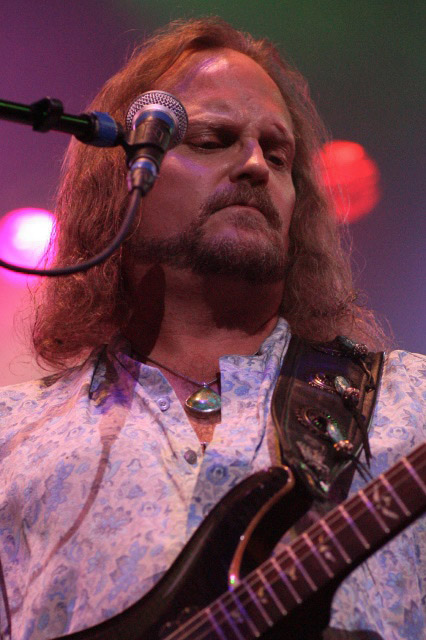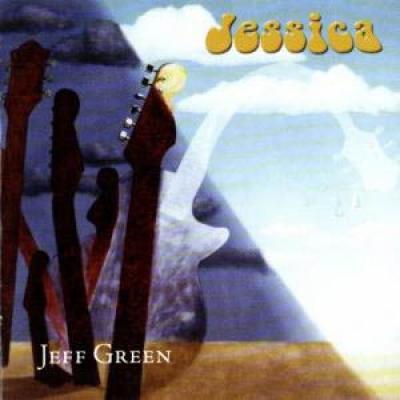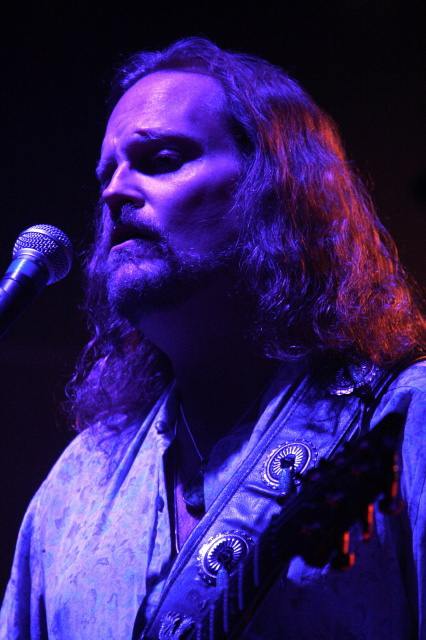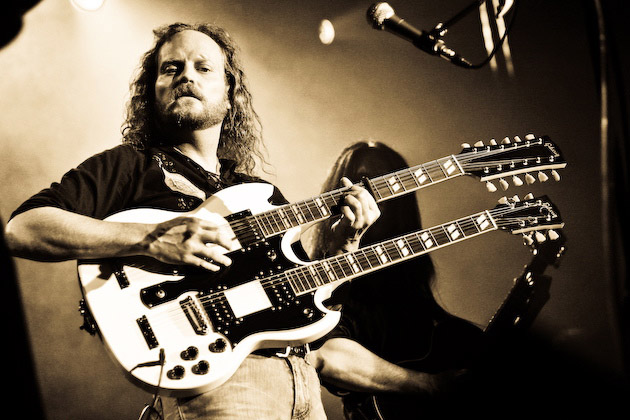|
Interview Jeff Green “I had to keep my focus on what I was trying to achieve with the album while telling Jessica's story” (December 2011, text by Henri Strik, edited by Peter Willemsen, pictures provided by Phil Chelmsford) Sometimes you receive an album telling a sad story that actually really happened. This was also the case with Jessica (see review), the first solo album recorded by the American born musician Jeff Green. In the interview below he tells, amongst others, about the death of his daughter and how it became a main inspiration for an album and for the awareness of stillbirth. Would you please introduce yourself and tell something about your musical background to our readers? Jeff Green : “I was born in Northern California in 1966 and began playing the recorder at the age of seven. A few years later I moved on to the clarinet and took a few piano lessons. In 1976, I saw Rick Wakeman playing at the Hammersmith Odeon in London when I was visiting my mother. That's when I decided that I wanted to be a musician when I grew up! A few years later an older brother of a friend of mine played the Pink Floyd album Dark Side Of The Moon and that's the moment that I decided to become a professional guitar player!”
What is the reason that you recorded Jessica and why it took so long before it was released? “My album Jessica is dedicated to my daughter. I lost her when she was stillborn on 31st May 1996, as well as the events surrounding that fateful day and the experiences and emotions I went through. Originally, I was just going to write one song as a sort of tribute to Jessica, but once I started the music just kept flowing and I realized that the writing process was actually helping me to deal with my grief. More and more music kept spilling out of my guitar and I realized that I had more than one album worth of material. A few months after that I was speaking with the matron at the hospital who delivered Jessica and she gave me the idea about putting the profits of the album towards building a bereavement room for parents that unfortunately have to go through the same event. There were several reasons why it took so long to finally finish the album. After the songs were written, I sometimes found it difficult to go back to them and record parts without reliving the experience, so I had to do it bit by bit. Also, there were financial and time constraints as I was financing it myself and touring with various bands at the time.”What did you want to achieve with this album and how can the outside world help you? “I really want to raise awareness about stillbirth and eventually see a bereavement room in every hospital in the UK. It's such a taboo subject and is much more common than people think. Please, buy the album and help to spread the word!”Would you please introduce the musicians that worked with you on the album and how you came in contact with them? “Pete Riley, who I had played in various cover bands with, played drums. On bass, I had three different players: Mark Cunningham who I've known for years, Tim Vogt, who played in my original band North Point Park, and Glenn Sissons, who I played with in the Illegal Eagles, an Eagles tribute band. On keyboards I had Mike Stobbie (ex-Pallas) who again, I'd played with in various other bands and with whom I shared a great passion for progressive rock music. I mixed the album with Phil Hilborne who was a sort of mentor to me when I first moved to the UK in 1986 at his studio in Essex. He also contributed some trade-off leads with me at the end of Live Forever. Phil Aldridge, who played with me in the Illegal Eagles, contributed piano parts to Essence and Woman With Child.”
It must have been a very emotional process to write and to record the songs for Jessica. How could you get your mind free to work as a professional musician? “Well, the writing part I found very cathartic - it helped a great deal. However, it was after I had left the songs for a while and then came back to record the parts proper, that I found it emotional. Basically, I had to keep my focus on what I was trying to achieve with the album while telling Jessica's story.”Why does someone who has its roots in the country and southern rock music record a real progressive rock album? Why didn't you make an album in the style of music you have played most of the time? “Yeah, good question! I think subliminally. Progressive rock music is who I am as a musician. Certainly, due to the nature of this type of music, I found it the best way to express my feelings with this album with large soundscapes, longer song lengths and having the freedom to write in a way that other genres don't really allow me to.”Did you have a first idea of how the album would sound before it was recorded? “No, not really, I had an idea that it was going to be largely instrumental and guitar driven. As far as the concept goes, I wanted to cover the entire range of emotions we went through; from her conception right through her death.”Would you please tell us something about the individual content of each song? “Firstly, there are three 'Leitmotifs' that carry Jessica's main melody: Vision, Essence and Being which come to fruition in the song Jessie's Theme. These leitmotivs explain her development from deciding to conceive, her development in the womb and her physical self.For The Future is about planning for a child and what it means to have that child's future in your hands. On This Night is about the feeling we had when we discovered one evening in August 1995 that my wife Jude was pregnant. All the thoughts of what it would mean to a father, the obvious joys, but also the responsibility and changes that come with it. Willing The Clouds Away represents various complications and fears that we had surrounding the pregnancy due to Jude's age. There were problems with Jessica's liver and we had to take tests to rule out the Down Syndrome. I was sitting outside with my guitar one day and I realized that I was powerless to control any of the potential problems as I was to move the clouds that were gathering that afternoon. Pride is literally just that. So proud to know that I was going to be a father and would be bringing a new life into this world. 
Woman With Child was a tribute to Jude and indeed all women who carry life with them for nine months. To the beauty, strength and the relationship with an unborn child that only a woman knows. Jessie's Theme is the center piece of the album. Jessica's melody, that came to me in a dream, hinted at in the three leitmotifs and culminating in this song. It starts out light and pretty and then turns ominous. I was trying to express in music how in just seven minutes we went from the happiest moments of our lives to complete and utter heartbreak. Tomorrow Never Came is about the anger and disbelief I felt immediately after... was it my fault? Did I do something to deserve this...? Prittlewell Chase is the name of the road the Hospital is located. During the course of the evening, I must have driven up and down it more than fifty times going home to make calls, bring family to and from the hospital, collect things for Jude and so on. The road sign became engrained in my brain and would become forever synonymous with the experience, leaving and returning to the place where the tragedy occurred. The only time during this period where I could think and come to terms with what had happened were on these drives up and down Prittlewell Chase. Live Forever is about acceptance, but also gratitude to Jessica for giving me this experience to learn and grow from. Meet some incredible people, work with some amazing musicians and to make this music, through Jessica will indeed, Live Forever...” How did the outside world react to this album? “Everybody who played on it and those involved in the project, were very relieved that I finally finished it after eleven years! The reactions have been very positive. There have been lots of people writing to me with similar stories and others have told me that it has inspired them in other ways as well! Some people told me that it has made them appreciate what they have, so all in all I'm very pleased with the way it turned out!”Is there any chance that you will perform the music of Jessica live on stage? “Yes, hopefully there will be some dates in the diary for next year. I will keep you posted!”First your album was a private release, but later on it got a proper release by the Gonzo Multimedia/Voiceprint label. How did this happen? “That was all down to Phil Chelmsford, who has been a major help with the album. He arranged an interview with Jon Kirkman who works with Rob Ayling from Gonzo. Jon was impressed enough with the album to suggest to Rob that they put it on their books. Rob liked the album and decided to take it on and I'm truly honoured!”
How did you both go on after Jessica's death? Did your wife get pregnant again? “Well, we both felt that getting pregnant again would feel a bit too much like 'replacing' Jessica. Jude was very supportive of the album, but sadly, due to entirely different circumstances, we divorced about nine years later. We remained on good terms however, and she was very pleased with the way the album turned out.”I'm sorry to hear that you divorced. Would you release more albums in the future and what more plans do you have? “Presently I'm working on my second album Elder Creek which should be released in spring 2012. It's very much a prog project and deals with the subject of memory and how that memory - or loss thereof - makes us who we are. It has many of the same musicians that played on Jessica and I'm also looking to put together a line-up to perform songs from both albums live next year.”Which guitar players have influenced you as a musician and to what kind of music do you listen yourself? “Ha, ha! Too many to mention! If I had to narrow it down to ten I would say: David Gilmour, Steve Howe, Alex Lifeson, Steve Morse, Jan Akkerman, Steve Vai, Jeff Beck, Pete Townshend, Trevor Rabin and John Petrucci. I listen to all types of music as I really believe that there's something to be learned in everything one hears. Obviously I love prog rock, but I also listen to a lot of classical music and sometimes jazz.”I noticed that you have other hobbies apart from making music. It seems that you're interested in cooking, coaching and football. Why does a natural born American like you love Arsenal from England? What about Dutch football? “Well, that's because my mother hails from North London and I was surrounded by Arsenal fans as a kid! And sure, I love Dutch football. In fact my all time favourite player is Dennis Bergkamp! I also admire Marc Overmars, Marco van Basten, Ruud Gullit and of course Robin Van Persie. I always support The Netherlands right behind the USA and England!”Is there something you would like to tell our readers or did I perhaps forgot something important to ask? “No, these questions cover everything! I just want people to enjoy listening to my music as much as I have creating it. It has been a labour of love and emotion for me and with all profits going to charity I just hope people will give my album a chance and a listen... that's all I ask.”Jeff, thanks for this interview and telling your story! “The pleasure was all mine. Thank you very much!”Website Jeff Green review album 'Jessica' |
